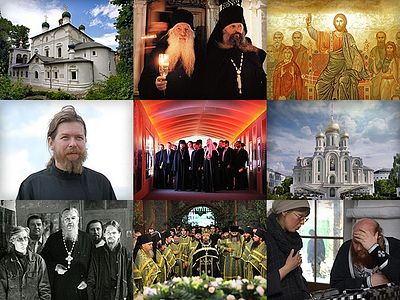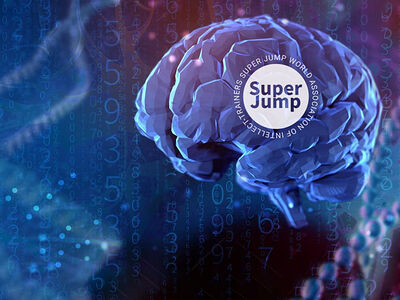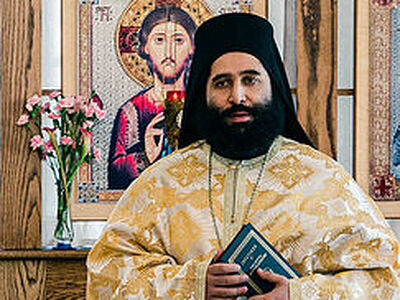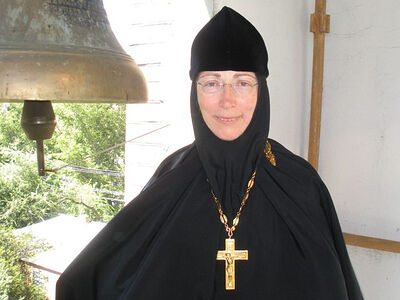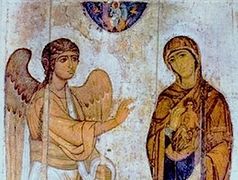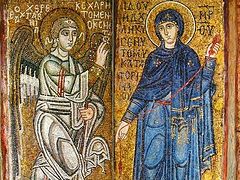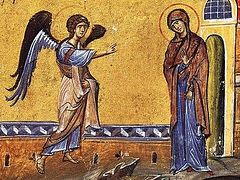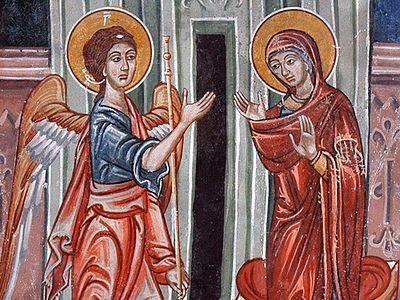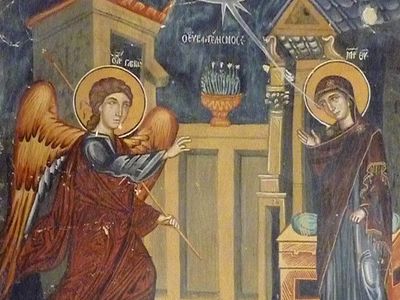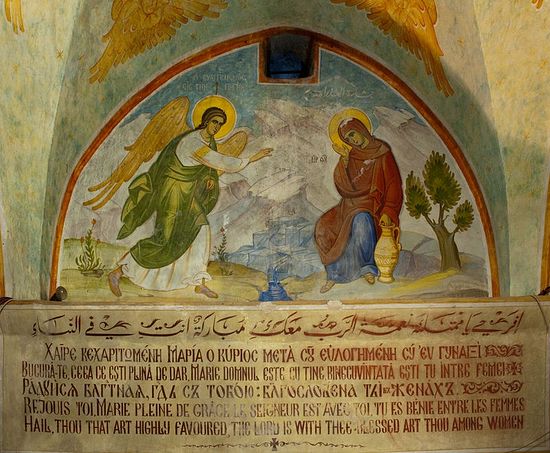
Matins
Luke 1:39-49, 45
And Mary arose in those days, and went into the hill country with haste, into a city of Juda; and entered into the house of Zacharias, and saluted Elisabeth. And it came to pass, that, when Elisabeth heard the salutation of Mary, the babe leaped in her womb; and Elisabeth was filled with the Holy Ghost: And she spake out with a loud voice, and said, Blessed art thou among women, and blessed is the fruit of thy womb. And whence is this to me, that the mother of my Lord should come to me? For, lo, as soon as the voice of thy salutation sounded in mine ears, the babe leaped in my womb for joy. And blessed is she that believed: for there shall be a performance of those things which were told her from the Lord. And Mary said, My soul doth magnify the Lord, and my spirit hath rejoiced in God my Saviour. For he hath regarded the low estate of his handmaiden: for, behold, from henceforth all generations shall call me blessed. For he that is mighty hath done to me great things; and holy is his name.
At the Vigil services on the eve of the Annunciation we hear the Gospel that is read at all the feasts of the Mother of God: And Mary arose in those days, and went into the hill country with haste, into a city of Juda; and entered into the house of Zacharias, and saluted Elisabeth. If we hasten to serve our neighbor, this will be the most sure sign that we have received the word of God. As soon as the Most Pure Virgin had received in her womb the eternal divine Word, she immediately hastened to serve her relative. Truly, for the sake of this service, and not to confirm the sign given her by the angel, does she rush to see righteous Elizabeth. Her faith acts through love (cf. Gal. 5:6). The word of God, Whom she now carries within, makes her light, heavenly, airy. She as if flies over the Judean hills. The Lord God is my strength, and he will perfectly strengthen my feet; he mounts me upon high places, that I may conquer by his song (Habakuk 3:19). As a season of beauty upon the mountains, as the feet of one preaching glad tidings of peace, as one preaching good news: for I will publish thy salvation, saying, O Sion, thy God shall reign (Is. 52:7) The Most Pure Virgin hastens to righteous Elizabeth, who was “advanced in years”. This is the New Testament going to the Old Testament.
After the Annunciation, the Mother of God quickly sets out upon the road. There is an urgent need for this. She mustn’t lose a single minute. Time has turned upside down, and become complete. We are walking with the Mother of God towards the last times. And we see how the infant of the aged Elizabeth greets the Infant of the young virgin. Thus does the flesh of the old man leap for joy at the appearance of the new. The Old Testament rejoices that it is giving place to the New. This is incomparably greater than what happened to Sara, who had become barren with age. The infant that Righteous Elizabeth bore trembled. He was not Isaac, the “son of laughter”1, but the laughter itself. For laughter is the fullness of joy, the mystery of the future age.
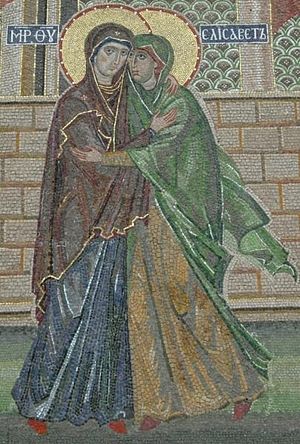
And she says to the Mother of God, blessed is she that believed: for there shall be a performance of those things which were told her from the Lord. She does not even say that the Most Pure Virgin is blessed because she was chosen to be the Mother of God. Rather, she is blessed because she believed. Not her divine Motherhood but her faith primarily makes her blessed. This is said in the Gospels so that we would know how great is the joy of believing. Believing is no less blessedness than the conception of the Son of God Himself. What unfathomable power there is in faith! Christ says nothing other than this when the woman in the crowd cried loudly, Blessed is the womb that bore Thee, and the paps which gave Thee suck.” He said only, Blessed is he that hears the word of God and keeps it.
Through the gift of the Annunciation we find ourselves in the time of faith, the time of the Church of the New Testament. Our service is similar to that of the time of the Ark of the Covenant—to carry the Pre-eternal Word. Each of us according his strength is called to follow after the Mother of God to everything that is old and falling apart, and bring the hope of the Cross, so that the human race might tremble with joy at the Lord’s coming to it. We know that it is not we who give joy, but the One Who is coming and Who goes before us. We bear Him and He bears us, for He is the cornerstone of the building that we are.
The haste with which the Mother of God goes humbly to righteous Elizabeth undoubtedly signifies mankind’s path to God. The leaping for joy of the infant John is his mother’s womb is nothing other than our awakening at this meeting. Everything in the world depends upon whether we receive the light of the Annunciation that illumines us.
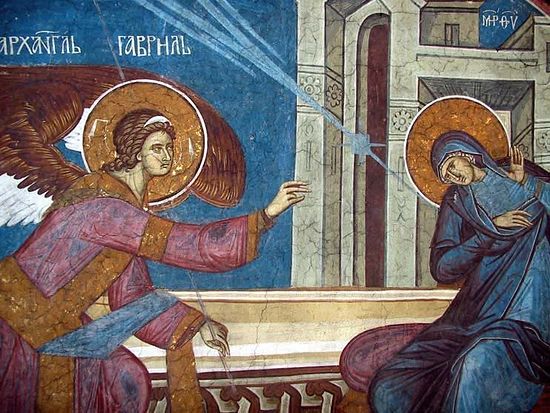
Liturgy
Luke 1:24-38
And after those days his wife Elisabeth conceived, and hid herself five months, saying, thus hath the Lord dealt with me in the days wherein he looked on me, to take away my reproach among men. And in the sixth month the angel Gabriel was sent from God unto a city of Galilee, named Nazareth, to a virgin espoused to a man whose name was Joseph, of the house of David; and the virgin's name was Mary. And the angel came in unto her, and said, Hail, thou that art highly favoured, the Lord is with thee: blessed art thou among women. And when she saw him, she was troubled at his saying, and cast in her mind what manner of salutation this should be. And the angel said unto her, Fear not, Mary: for thou hast found favour with God. And, behold, thou shalt conceive in thy womb, and bring forth a son, and shalt call his name Jesus. He shall be great, and shall be called the Son of the Highest: and the Lord God shall give unto him the throne of his father David: And he shall reign over the house of Jacob for ever; and of his kingdom there shall be no end. Then said Mary unto the angel, How shall this be, seeing I know not a man? And the angel answered and said unto her, The Holy Ghost shall come upon thee, and the power of the Highest shall overshadow thee: therefore also that holy thing which shall be born of thee shall be called the Son of God. And, behold, thy cousin Elisabeth, she hath also conceived a son in her old age: and this is the sixth month with her, who was called barren. For with God nothing shall be impossible. And Mary said, Behold the handmaid of the Lord; be it unto me according to thy word. And the angel departed from her.
The feast of the Annunciation is the first flower of Pascha, which Gabriel holds in his hand. “Rejoice, Thou who art full of grace, the Lord is with Thee!” And on Pascha, when everything is blossoming with the new, divine life for which man was created, we hear, “The Angel cried to the Lady full of grace: Rejoice O Pure Virgin. Again, I say: rejoice!” This life consists in love—God’s love for man and man’s love for God. For God so loved the world, that he gave his only begotten Son, that whosoever believeth in him should not perish, but have everlasting life (Jn. 3:16). And this is fulfilled on the day of the Annunciation in the Incarnation of the Son of God. The Most Pure Virgin so loved God with all her heart, mind, soul, and all her strength that God the Word became flesh in her and through her. This love, this divine life is revealed to us as the mystery of the Most Pure Virgin Mary’s obedience. Her trust in God is boundless—with all her soul and body, youth and old age, maternity and virginity she belongs to the Lord. There is no word, nor thought, nor movement in her other than according to God’s will. She is in God and not in herself. She thinks of nothing but being the Handmaid of the Lord. But for this humility God chooses her to be His mother.
The entire story of the human race, beginning from the fall, when the first people in paradise were promised by God that one day the seed of a woman will crush the head of the serpent, has reached for this event. And the best of all human sons and daughters yearned for this day and hour, when upon the tree of mankind, on the chosen branch, this miracle might blossom, this paradisal blossoming—the Most Pure Virgin Mary.
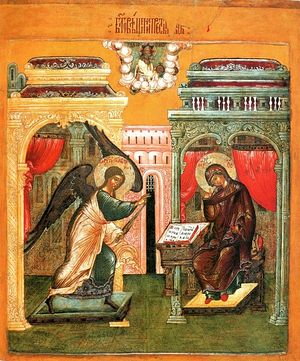
God sends the Archangel Gabriel to earth. We follow after him and see that he is going not to royal, triumphant Rome, not to the sophists of Athens, not to arrogant Babylon, and not even to holy Jerusalem. He goes to Nazareth, the obscure settlement in Galilee, about which Nathaniel would later say, “Can anything good come out of Nazareth?” But in this unassuming settlement there is a house where is the treasure of heaven and earth, where there is all the love of the Pre-eternal Father for the world. In this house is the Virgin, who is higher than heaven and earth together—chosen out of all generations so that we might attain the unattainable.
Church tradition tells us that the Archangel Gabriel went in to the Most Pure Virgin Mary while she was contemplating the prophecy of Isaiah, where it speaks of the birth of Emmanuel from a Most Pure Virgin (Is. 7:14). In her thoughts was the desire to become the least handmaid of this chosen one of God. And the Lord looked upon the movement of her heart—He looked upon the lowliness of His handmaiden. Her spirit burned with heavenly love to serve in the mystery of the Divine Incarnation. And when the Angel came in to her, she was open to receive this gift.
In the Gospels it says that she was troubled at the Archangel’s saying. She had this feeling not because she had seen an angel, for abiding at the temple she had continual concourse with angels. This feeling came from the greeting that had never before been pronounced to anyone, neither in heaven nor on earth, nor to any created being: Rejoice Thou who art full of grace, the Lord is with Thee. In the depths of her humility of wisdom, in her heart, she tries to penetrate the mystery of these words. Reading her thoughts, the Archangel answers her that she is that very Chosen One of God. He speaks of her giving birth to the Son of God and names His illuminating Name, before Whom every knee should bow, of things in heaven, and things in earth, and things under the earth (Philip. 2:10). By this name are all signs and wonders worked, and by it is the world saved.
“Today is the crown of our salvation.” The joy of the Annunciation is revealed to the Most Pure Virgin Mary and to the entire human race; to all who accept this joy—the joy that God has become man. There has never been anything in the world like this before. This mystery is the highest, the humblest, the greatest tidings from God that had ever been. Nothing on heaven or on earth can compare with this mystery. There is nothing more precious in anything that has ever been in the history of the world, and there will never be anything more precious. All the saints stand before this mystery, and all the saints of all ages would not have sufficient eternity to contemplate it.
The Archangel Gabriel tells the Mother of God of the divine and royal dignity of the Son Whom she will conceive and to Whom she will give birth. He shall be great, and shall be called the Son of the Highest: and the Lord God shall give unto him the throne of his father David: And he shall reign over the house of Jacob for ever; and of his kingdom there shall be no end. “When she became the Mother of the Creator,” says St. John Damascene, “she became in truth the Mistress of all creation.” We call her the Queen of heaven and earth because she is the Mother of the King, Creator, and Master of the visible and invisible world. And the greater her humility, the greater she exalts her Lord. The more she is a handmaiden of the Lord, the more she is the Queen. Due to her exclusive participation in the work of salvation of all mankind wrought by her divine Son, she is the first to receive the gift of salvation.
How shall this be, seeing I know not a man? In this question of the Most Pure Virgin Mary is expressed the natural amazement of human nature before the mystery surpassing all understanding, both angelic and human—even for the one who was chosen to fulfill this mystery. The Most Pure Virgin Mary’s ever-virginity is her immutable law, and she cannot violate it. And natural birth, not without seed, not without a man, is likewise the inalienable law of nature. How can this be? This is not lack of faith, nor denial, but the perplexity of human nature itself, which cannot understand the superhuman divine conception.
She receives from God through the angel a straightforward and clear answer, in which is revealed the mystery of God’s incarnation and the mystery of the Most Holy Trinity: The Holy Ghost shall come upon thee, and the power of the Highest shall overshadow thee. These words speak of the mystery of the Father, pre-eternally begetting the Son, and sending the Spirit. The Holy Spirit will descend upon the Most Holy Virgin Mary and from her will be born the Son of God. God reveals this mystery of mankind’s salvation, and in confirmation of His words the Archangel says that what is impossible to man is possible for God. Thus also occurred the conception of St. John the Forerunner to Elizabeth, “called barren,” for with God nothing shall be impossible. Everything has been wrought by God, everything has been revealed by God for our salvation, and now it is up to man.
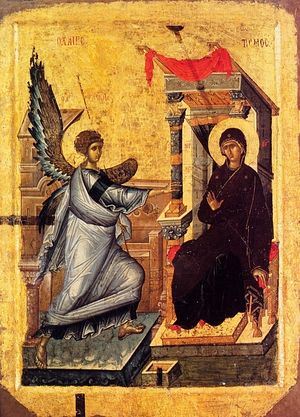
The Most Pure Virgin Mary’s answer is the joyful, prayerful concentration of all ages of Christian sanctity; the fate of every person, into which we are all called to delve. Let everyone who turns his mind and heart to the Lord always stand before this mystery, and with thankfulness witness the joy of today’s feast. The Annunciation has happened. Be it unto me according to thy word.
She pronounces these words, and God fills them with His divine, grace-filled power. She touches the heights and the depths that until then no one had touched, which was hitherto unknown by any of the greatest saints out of the whole human race. And what is revealed to her surpasses everything she knew about God. It surpasses even what she could know about Him now. She prays to Him, and her “Be it unto me” is immediately, at that very moment, received by God. Through the gift of the Holy Spirit and the strength of her virtues, which are marked by the words, “Be it unto me”, something new is revealed for all people; something new is wrought with the Most Pure Virgin Mary, with her soul and body. And to all mankind is revealed the newness of the life that is in God. The will of God is fulfilled on earth for all people.
This answer is most brief, most sure, in which there is nothing superfluous, nothing that does not correspond to the fullness of this great event. Through her, the Most Pure Virgin Mary, and with her, the whole rejoicing creation, the “Angelic hosts and the race of man” pronounce this answer. And every human soul capable of accepting the Holy Spirit and being one with Christ gives this answer, because the Most Pure Virgin Mary pronounced these words.
The world became different, completely different from what it was earlier. Because these words were pronounced, heaven and earth, the divine and the human—the separate natures united. Man received the power to become god by grace, because God united with man. The creation of man and the world has for the first time inwardly completely taken place. The Holy Spirit, which moved upon the waters at the creation of the world, came down into created human nature. And the conception of the Son of God and Son of Man has taken place.
On the feast of the Annunciation let us examine ourselves, whether we respond to God’s call for our lives according to the example of the Mother of God? This agreement will give us the courage to see where our strength is and where our is weakness; to understand every seemingly hopeless circumstance; to accept this person, this child, these parents, this companion, this faithfulness—this cross. So that we would not forget that between us there is always present this all-deciding conversation on the heavenly, ultimate heights. And God waits for when the doors separating us from each other might be thrown open. There is no other way, no other path besides the one that God offers; to go forth to meet another and go with him to meet yet another. I am the door, says Christ, speaking to us through His Divine Person. In Him God comes in response to the Mother of God’s humble acceptance of Him, in order to meet with us forever.
Now are the doors of paradise open. The fiery cherubim do not bar the entrance but invite all to enter that place where the password is, “Be it unto me according to Thy word.”

